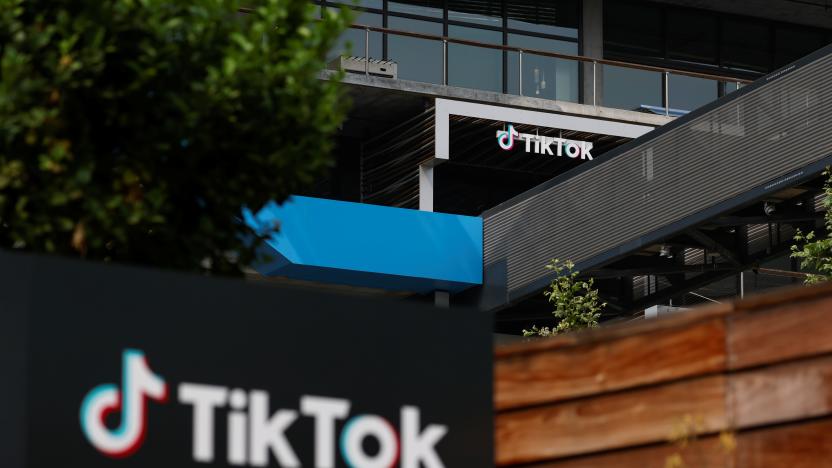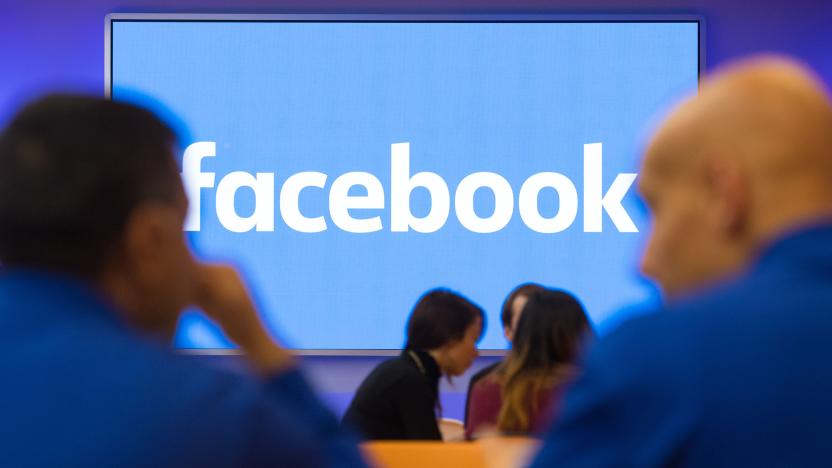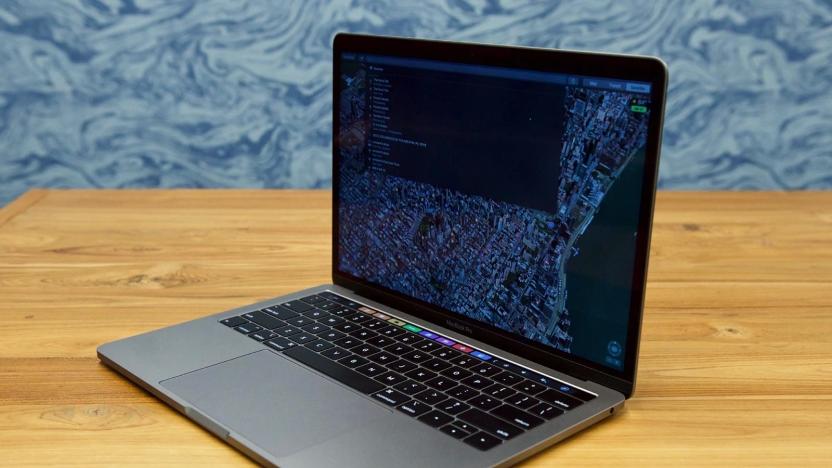class-action lawsuit
Latest

TikTok will pay $92 million to settle class-action data harvesting lawsuit
TikTok has agreed to pay $92 million to settle a class-action lawsuit alleging it collected and sold personal data belonging to users without their consent.

Facebook will pay content moderators $52 million in PTSD settlement
Each of the 11,250 plaintiffs will receive at least $1,000.

It doesn’t matter if China hacked Equifax
On Monday the FBI and AG Barr announced "an indictment last week charging four members of the Chinese People's Liberation Army (PLA) with hacking into the computer systems of the credit reporting agency Equifax and stealing Americans' personal data and Equifax's valuable trade secrets." China's military refutes the charges.

Apple loses bid to stop class action lawsuit over MacBook keyboards
Apple will have to face a class action lawsuit over faulty MacBook keyboards. Federal Judge Edward Davila has tossed out Apple's attempt to dismiss a suit accusing the company of not only hiding the fragility of MacBook butterfly keyboards, but of failing to provide an "effective fix" or full compensation for customers who paid for repairs. The suit claims that Apple violated multiple states' consumer protection laws, potentially leaving the company on the hook for many users who dealt with sticky or unresponsive keys when even a slight amount of debris slipped into their keyboards.

Online sneaker reseller StockX faces lawsuit over data breach
StockX is now facing legal action over a data breach that led to the theft of more than 6.8 million customer records. A class-action lawsuit filed in US District Court this week alleged that the online sneaker marketplace compromised the data of minors. According to The Detroit News, the plaintiff in the case is a Kansas minor identified as "I.C.", whose personal information was stolen and re-sold by hackers. The lawsuit is being bought on behalf of all youth who were impacted by the breach.

Appeals court allows Facebook facial recognition lawsuit to proceed
Facebook users now have the green light to sue the company over its use of facial recognition tech. The 9th US Circuit Court of Appeals in San Francisco ruled in the plaintiffs' favor 3-0 after Facebook tried to block a class-action lawsuit which claims it illegally captured and stored millions of users' biometric data without their consent.

'Pokémon Go' settlement promises action on nuisance Pokéstops
Niantic, the creator of Pokémon Go, has reached a tentative settlement in a class action lawsuit filed against the company by homeowners who claim the game caused players to stumble into their yards searching for Pokémon. As part of the agreement, the company will be more responsive in fielding nuisance complaints from private property owners and will remove gyms and PokéStops that appear near residential areas.

Appeals court sides with ex-NFL players in Madden likeness suit
A federal appeals court struck down Electronic Arts' appeal to dismiss a 2010 lawsuit in which retired NFL players alleged that the publisher used their likenesses without permission in Madden NFL 09. A three-judge panel unanimously declined EA's motion to dismiss the lawsuit on the grounds of First Amendment protections under "incidental use." Madden 09 included over 140 historic NFL teams as well as the stats and positions of thousands of retired athletes to celebrate the series' 20th anniversary, and EA allegedly altered jersey numbers and removed the players' names to avoid paying licensing fees, according to the August 2010 lawsuit. The judges referred to another recent likeness lawsuit in the opinion, in which former college athletes sued EA in May 2009 over the use of their likenesses in NCAA Basketball and NCAA Football games. EA proposed a $40 million settlement to that lawsuit in September 2013, resulting in those players earning up to $951 for each year their likeness was featured in the games. The publisher added $8 million in expenses related to that lawsuit in May 2014. EA introduced similar First Amendment-based defenses in its appeal for the retired NFL players lawsuit save for one additional argument: That the likenesses were protected under the First Amendment as incidental use. The judges "held that Electronic Arts's use of the former players' likenesses was not incidental because it was central to Electronic Arts's main commercial purpose: to create a realistic virtual simulation of football games involving current and former National Football League teams." The decision upholds a California court's March 2012 dismissal of EA's attempt to prevent the suit from going to court. Among the plaintiffs listed in the lawsuit is Sam Keller, a former Arizona State, Nebraska and Oakland Raiders quarterback that filed the original likeness lawsuit related to the publisher's college sports games. [Image: EA]

Lawyer: Apple secretly deleted rival's music files from consumer iPods
Arguing for consumers in a class action iPod lawsuit against Apple, Attorney Patrick Coughlin accused the Cupertino company of deliberately deleting music files downloaded from competing music services. These files were removed from customer's iPods without their knowledge or consent between 2007 and 2009, reports the Wall Street Journal. When a user who had downloaded music from a rival service tried to sync an iPod to the user's iTunes library, Apple would display an error message and instruct the user to restore the factory settings, Coughlin said. When the user restored the settings, the music from rival services would disappear, he said. Apple directed the system "not to tell users the problem," Coughlin said. Lawyers for the plaintiffs in the case argue this behavior supports their claim that Apple deliberately stifled competition in the then exploding music player and download market. The class-action suit seeks more than US$350 million in damages for this and other anti-competitive practices. In its rebuttal, Apple claims the removals were legitimate security measures to prevent hacking that required no explanation. "We don't need to give users too much information," testified Apple security director Augustin Farrugia. "We don't want to confuse users." Filed on behalf of iPod owners in the early 2000s, the decade-old class action lawsuit finally began this week in a Northern California court. Both Apple VP of Internet Services Eddy Cue and Marketing head Phil Schiller are expected to testify sometime this week. A deposition from Steve Jobs recorded in 2011 also is being aired as part of the proceedings.

Battlefield 4 class action lawsuit dismissed on 'puffery'
No, not puffinry. Puffery. A class action lawsuit levied against Electronic Arts for allegedly misleading investors over the performance of Battlefield 4 was dismissed this week, with U.S. District Court for the Northern District of California Judge Susan Illston labeling the publisher's promises as pre-release "puffery," rather than intentionally misleading hype. The lawsuit was filed late last year, accusing Electronic Arts of misrepresenting "the development and sales of the Company's Battlefield 4 video game and the game's impact on EA's revenue and projects moving forward." Battlefield 4 suffered numerous issues upon its launch in November, leaving many players unable to access its online multiplayer component. Fixes arrived months after the game's initial release, leading EA CEO Andrew Wilson to later describe the debacle as "unacceptable." EA argued that its pre-release statements had no direct bearing on the plaintiffs' decisions to purchase company stock. In addition, the publisher noted that five of the eight company-issued statements labeled as misleading in the suit were made after plaintiffs had already purchased EA stock. "Defendant [CFO Blake] Jorgensen's Oct. 29, 2013 statement comparing 'BF4' to a World Series ace pitcher is puffery," Judge Illston wrote. "Defendant Wilson's Oct. 29, 2013 statement explaining that EA 'worked more closely with Microsoft and Sony throughout the entire process' resulting in a 'launch slate of games that are the best transition games that I've ever seen come out of this company' is an inactionable opinion, as well as a vague statement of corporate optimism." Illston's response does not represent a total dismissal of the case. Lead plaintiffs Ryan Kelly and Louis Mastro must revise their statements by November 3 to continue the suit. [Image: Getty]

Sega pins Aliens: Colonial Marines marketing mishaps on Gearbox
After Aliens: Colonial Marines publisher Sega moved to settle a class-action lawsuit to the tune of $1.25 million in August for alleged false advertising for the game, it shifted the blame for the game's marketing issues to Gearbox Software, according to court documents obtained by Game Informer. Internal emails from Gearbox and Sega representatives cite examples of the former revealing information about the game without the consent of the publisher. One such email refers to a New York Comic Con panel in October 2012, in which Gearbox CEO Randy Pitchford firmly states that a Wii U version of Aliens: Colonial Marines would launch in February 2013 alongside the other versions of the game. Emails within Sega stated that "no-one on the call was aware" of the Wii U version, and that it's "not been picked up so far." Of course, the game missed its Wii U launch window before Sega confirmed in March 2013 that it was no longer in development.

Court approves settlement over Sony's 2011 PSN breach
The US District Court for the Southern District of California approved a settlement for the class action lawsuit resulting from Sony's 2011 PSN data breach. The settlement may result in Sony doling out as much as $17.75 million, which includes an offer for one free game (PS3 or PSP only), three PS3 themes or credit for three months of PlayStation Plus membership (valid only for new subscribers). The claimant groups are divided based on whether PSN account holders prior to May 15, 2011 took advantage of the "Welcome Back" program following the intrusion. Those that did not accept the PSN Welcome Back offer can claim two of the benefit options among the games, themes and PS Plus membership credit on a first come, first served basis until a $6 million allocation from Sony is reached. For those that did take advantage of the program, they will receive one of the benefits above until a $4 million allocation is reached.

Grand Theft Auto Online class-action lawsuit dismissed
A class-action lawsuit filed against Rockstar Games and Take-Two has been dismissed by a US District Court in California today, Game Politics reports. The plaintiffs in the class-action suit argued that Rockstar and Take-Two failed to deliver the full, promised Grand Theft Auto 5 experience – specifically, the online portion of the game, GTA Online. The suit claimed the state of Grand Theft Auto 5 at launch last September was "unlawful," "unfair" and "fraudulent" on the part of Take-Two and Rockstar. Judge Virginia A. Phillips disagreed, citing there is no language on the Grand Theft Auto 5 packaging guaranteeing the online portion of the game "immediately." GTA Online launched on October 1, weeks after GTA 5 made its $1 billion debut at retail. Since then, Rockstar has iterated on its multiplayer offering by adding race and deathmatch creation tools, along with Rockstar Verified Jobs. Co-op heists will be added to GTA Online later this year.

EA finds itself in third law firm's iron sights over Battlefield 4 issues
EA has been under a lot of scrutiny lately. First, law firm Holzer Holzer & Fistel, LLC launched an investigation to uncover whether or not the company deliberately misled investors on the state of Battlefield 4 and the game's impact on company revenue. Then, law firm Robbins Geller Rudman & Dowd, LLP filed a class action lawsuit against the publisher. Now, law firm Bower Piven has likewise filed for a class action lawsuit, and is currently seeking a lead plaintiff. Investors who lost more than $200,000 between July 24 and December 4 of this year have until February 17, 2014 to contact Bower Piven, should they wish to take up the mantle of lead plaintiff. The law firm alleges that EA violated the Securities Exchange Act of 1934 by failing to disclose the game's multitude of issues before release, which in turn left investors unable to make informed choices about their investments. EA's stock declined sharply following the announcement that future DICE projects would be put on hold until Battlefield 4 was fixed, hence Bower Piven's case. This legal kerfuffle is starting to look like a regular battle(field).

Battlefield 4 targeted in class action lawsuit
Law firm Robbins Geller Rudman & Dowd LLP has filed a class action lawsuit against Electronic Arts alleging that the company issued "materially false and misleading statements" regarding the quality and playability of its troubled first-person shooter Battlefield 4. Battlefield 4 has seen numerous patches in the weeks following its release, addressing major issues ranging from client crashes to save file corruption. The suit highlights the PlayStation 4 version of Battlefield 4 in particular, claiming that "players of Electronic Arts' games were being subjected to multiple glitches and significant crashes when attempting to play Electronic Arts' titles on PS4." The Robbins Geller Rudman & Dowd suit marks the second time a law firm has targeted Electronic Arts over Battlefield 4 this month. Previously, Holzer Holzer & Fistel, LLC launched an investigation to determine whether EA misled investors regarding Battlefield 4's projected impact on company revenue. The results of this investigation have not yet been disclosed. Individuals who purchased EA common stock between July 24 and December 4, 2013, have until February 15 to contact Robbins Geller for representation in the firm's class action lawsuit.

Daily Update for July 30, 2013
It's the TUAW Daily Update, your source for Apple news in a convenient audio format. You'll get all the top Apple stories of the day in three to five minutes for a quick review of what's happening in the Apple world. You can listen to today's Apple stories by clicking the inline player (requires Flash) or the non-Flash link below. To subscribe to the podcast for daily listening through iTunes, click here. No Flash? Click here to listen. Subscribe via RSS

Apple Store employees file lawsuit, claim company not paying for security searches
Apple's anti-theft procedure for its employees is the topic of a class action lawsuit filed by two former Apple employees, according to a report in AppleInsider. The lawsuit was filed last week by Amanda Frlekin and Dean Pelle in the United States District Court for the Northern District of California. Like many retailers, Apple has a security checkout procedure that requires employees to submit to a personal package and bag search whenever they clock out for a break or leave at the end of the shift. The search can take up to 15 minutes, which is time not compensated by Apple. According to the complaint, "[one plaintiff] worked approximately 50 minutes to 1.5 hours of uncompensated overtime. By conservative calculations, this equated over the course of one year to an aggregate amount of approximately $1,400 in uncompensated hours." The lawsuit seeks to end this practice and provide compensation to employees who were subjected to these searches. The complaint is a class action lawsuit that extends to "[a]ll Apple Hourly Employees who worked in an Apple, Inc. retail store in the United States, who are or were employed within the three years preceding the the filing of this action by the Defendant, and who were: (a) not compensated for off-the-clock time spent waiting in security screening lines and undergoing personal package and bag searches before being allowed to leave the premises; and/or (b) were not fully compensated for this time worked over forty hours per week at overtime rates."

Sega and Gearbox targeted in Aliens: Colonial Marines lawsuit
Gearbox Software and Sega have both been named in a class action lawsuit alleging that the two companies knowingly misrepresented Aliens: Colonial Marines in trade show demos. After the game was released to negative reviews, some players and critics claimed the game's trailers and demonstrations didn't match up to the final product. The lawsuit's plaintiff, Damion Perrine, and the law firm of Edelson LLC have decided to take the matter to court for consumers. The suit cites a tweet from Gearbox head Randy Pitchford, who called initial complaints over the delta between demo and final game "understood and fair." The legal action also suggests demos were misleadingly labeled as "actual gameplay," and that Sega embargoed press reviews until the early morning of Colonial Marines' release date, preventing early buyers from discovering the differences. Accordingly, the suit asks for class action damages for anyone who pre-ordered the game or bought it on release day. The next step in a class action suit like this will be for the courts to certify the class. Unless Sega and Gearbox fight for a settlement right away, Edelson will next need to figure out how many players were mislead in the way described in the lawsuit. Once determined, the class will be notified of the suit, and the case can move forward.

Blizzard's response to authenticator lawsuit: 'Without merit'
A few days ago Massively reported that a class-action lawsuit had been brought by players against Blizzard Entertainment. The lawsuit claims that Blizzard's actions (and inactions) were forcing players to purchase physical authenticators for Battle.net. Today we've heard the response from the studio, which is an unsurprising dismissal of the accusations. Blizzard released a statement that began as follows: "This suit is without merit and filled with patently false information, and we will vigorously defend ourselves through the appropriate legal channels." The studio went on to address the concerns brought up by the lawsuit and defend its actions during the past summer's Battle.net security breach. Blizzard said that the onus to secure one's computer is on the operator, which is why the company "strongly encourages" the use of authenticators.

Class action lawsuit from PlayStation Network hack mostly dismissed
Federal Judge Anthony Battaglia dismissed several key claims of a class action lawsuit leveled against Sony after 2011's PSN hack. Battaglia's order dismissed such claims as negligence, restitution, unjust enrichment, bailment and violations of California consumer protection statutes, Courthouse News reported.Battaglia found that Sony didn't violate consumer protection laws because "none of the named plaintiffs subscribed to premium PSN services, and thus received the PSN services free of cost." Additionally, the privacy policy that all subscribers signed included "clear admonitory language that Sony's security was not 'perfect,'" and "no reasonable consumer could have been deceived."The bailment charge was dropped because "plaintiffs freely admit, plaintiffs' personal information was stolen as a result of a criminal intrusion of Sony's Network," Battaglia wrote. "Plaintiffs do not allege that Sony was in any way involved with the Data Breach."Battaglia offered the class an option to amend its claims for injunctive relief and violation of consumer protection law.














